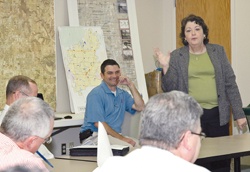City Walks Path to Efficiency
by September 17, 2012 12:00 am 97 views

Springdale’s city officials wanted to make the process of getting a business license easier for business owners. So with the help of a consultant late last month, a team from five city departments literally walked through the current application process.
Using a couple of real-life examples from their files, a team member came into the office as a customer applying for a business license. The team noted what steps could be confusing or cumbersome for applicants, and then brainstormed ways to simplify them.
Led by Chad Smith, founder of Continuous Improvement Solutions LLP, personnel from the mayor’s office, city clerk, IT, planning, and building and fire inspection took part in a three-day work session called a kaizen (pronounced KY zen) event.
On the final day, team members presented what they had learned from the exercise and their recommendations. These included the development of a business license pre-application checklist and making more services available to the public online.
Springdale mayor Doug Sprouse said the team would present its recommendations to the City Council at its Sept. 11 meeting, and that there may be some ordinance changes the council can make to facilitate these improvements. City personnel have a target of the first of the year to roll out the newly streamlined application process, Sprouse said.
This was Smith’s second time to work with Springdale officials. Late last year, he took them through the same steps with the city’s commercial building permit application process.
At the heart of CIS’ methodology is the concept called kaizen, a Japanese term meaning change for the better. In the business world, it’s a process aimed at eliminating waste and improving productivity.
Automaker Toyota is often noted as an example of a company that is successful largely because of its use of kaizen. The goal of a kaizen, Smith said, is to take apart a process, analyze it, and put it back together in an improved manner.
A kaizen event typically lasts three to five days, Smith said, and comprises four phases: plan, do, check and act. Participants first identify the current state of a process, such as applying for a business license, and walk through that process to evaluate it and look for opportunities for improvement.
Then they develop a new process that incorporates those improvements and walk through that to test it and see if it needs further refinement.
“Within a week’s time, a team can get so much done because they’re so laser-focused,” Smith said.
All levels of employees are expected to participate, he said, and there is no rank among team members — everyone’s ideas are equal.
“A key tenet of kaizen is that doing something is better than doing nothing,” Smith said. “Don’t let perfect get in the way of better.”
Smith stresses that all these business processes begin and end with the customer in mind.
His company’s teaching focus differentiates it from competitors, Smith said.
“We are not typical consultants who go in and tell people how to more profitably and efficiently run their business,” he said. “But we go in and create a coaching curriculum or program that will help them make their business better while we’re guiding them along that path.
“Organizations succeed when they do it for themselves because they own it. If they do it structured otherwise, it’s doomed to fail.”
With a bachelor’s degree in mechanical engineering from the University of Arkansas, Smith worked a few years for ExxonMobil. He knew then that he wanted to work in training, but didn’t know how to get started.
But later, as a quality manager for Black & Decker, he trained in the Lean and Six Sigma methods of quality management, and in turn began training others.
While still with Black & Decker, Smith founded CIS in the spring of 2005 when he created Northwest Arkansas Community College’s Lean Six Sigma Green Belt program.
A year later, he went to work for Wal-Mart Stores Inc., creating the company’s Continuous Improvement program.
In 2007, he made the leap into full-time consulting. Smith’s growing client roster includes Rockline Industries, Gates Corp., McKee Foods, Superior Industries, Oklahoma State University, the American Society for Quality and, through that organization, Anheuser-Busch.
His client companies range geographically from Mexico to Oklahoma and the Northeast. As demand for the company has grown, Smith has employed contractors to help out.
“Everything organizations do should have a mission and a purpose, and help develop a ‘true north’ for an organization,” Smith said.
The “true north” ensures an organization stays on track with its mission and goals, he said.
Smith points out that his methods will work for any industry.
“People think these processes are only applicable to manufacturing, but any time there’s a business process, there’s always room for improvement,” he said.
“When I went to boil oil at ExxonMobil, or in the business of making sales for Wal-Mart, at the end of the day, it’s just a process.”
